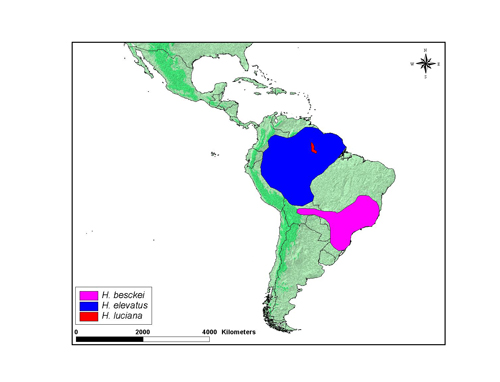Heliconius besckei
Margarita BeltránIntroduction
A Heliconius species belonging to the "silvaniform" group and exhibiting the common mimetic pattern or red band on forewing and yellow band in the hindwing.
Characteristics
Early stages: Eggs are yellow and approximately 1.2 x 0.9 mm (h x w). Females usually place 1 to 5 eggs on growing shoots of the host plant. Mature larvae have a white body and black spots, black scoli, and orange head ; length is around 1.7 cm. Caterpillars are gregarious (Brown, 1981).
Geographical Distribution
Heliconius besckei is distributed in South Brazil. The map below shows an approximate representation of the geographic distribution of this species. The original data used to draw these maps are derived from Brown (1979) which is available at Keith S. Brown Jr. (1979). Ecological Geography and Evolution in Neotropical Forests.
Habits
H. besckei occurs from sea level to 2,500 m in subtropical forests. Usually individuals fly rapidly in the middlestory. Females mate multiply and adults roost in loose groups at night at 2-10 m above ground on twigs or tendrils.
Hostplant: H. besckei larvae feed primarily on plants from the subgenera Granadilla and Dysosmioides (Passifloraceae) (Brown, 1981).
References
Brown K. S. 1981 The Biology of Heliconius and Related Genera. Annual Review of Entomology 26, 427-456.
Ménétriés, Edouard [1802_1861]1855-57. 1857 Enumeratio corporum animalium Musei Imperialis Academiae Scientiarum Petropolitanae. Classis insecto-rum. Ordo lepidopterorum. Petropoli, Eggers et Soc.; Lipsiae, Leop. Voss. 1: xv , 1-66 , 67-97 , [2] pp., pls. 1-6 (December 1855); 2: vi , 67-112 , [2] , 99-144 , [2] pp., pls. 7-14 (September 1857).
About This Page

University of Cambridge, Cambridge, UK
Correspondence regarding this page should be directed to Margarita Beltrán at
Page copyright © 2010
 Page: Tree of Life
Heliconius besckei .
Authored by
Margarita Beltrán.
The TEXT of this page is licensed under the
Creative Commons Attribution-NonCommercial-ShareAlike License - Version 3.0. Note that images and other media
featured on this page are each governed by their own license, and they may or may not be available
for reuse. Click on an image or a media link to access the media data window, which provides the
relevant licensing information. For the general terms and conditions of ToL material reuse and
redistribution, please see the Tree of Life Copyright
Policies.
Page: Tree of Life
Heliconius besckei .
Authored by
Margarita Beltrán.
The TEXT of this page is licensed under the
Creative Commons Attribution-NonCommercial-ShareAlike License - Version 3.0. Note that images and other media
featured on this page are each governed by their own license, and they may or may not be available
for reuse. Click on an image or a media link to access the media data window, which provides the
relevant licensing information. For the general terms and conditions of ToL material reuse and
redistribution, please see the Tree of Life Copyright
Policies.
- First online 18 February 2007
- Content changed 12 August 2008
Citing this page:
Beltrán, Margarita. 2008. Heliconius besckei . Version 12 August 2008 (under construction). http://tolweb.org/Heliconius_besckei/72896/2008.08.12 in The Tree of Life Web Project, http://tolweb.org/








 Go to quick links
Go to quick search
Go to navigation for this section of the ToL site
Go to detailed links for the ToL site
Go to quick links
Go to quick search
Go to navigation for this section of the ToL site
Go to detailed links for the ToL site